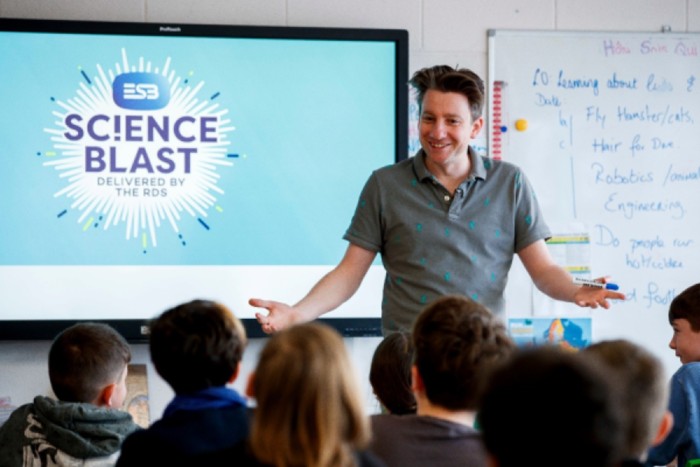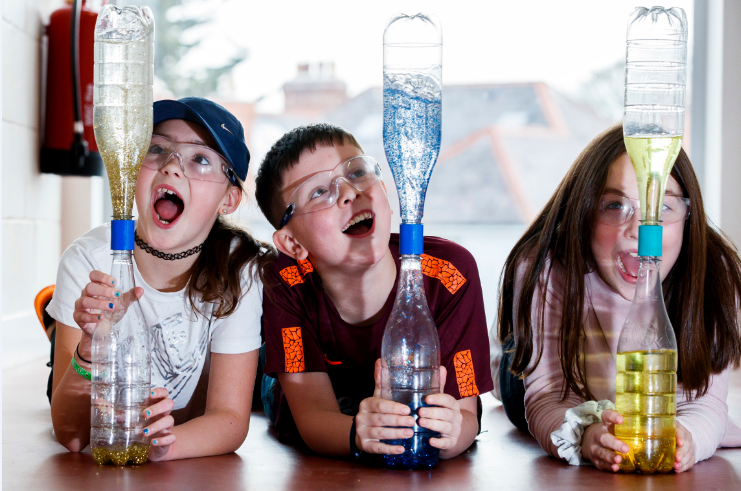Welcome to the second instalment of our educational blog “Generating Tomorrow's Curiosity” written by me, scientist and educator, Phil Smyth. Throughout this blog series, we will explore some thoughts behind engagement in STEAM (Science, Technology, Engineering, Art and Maths) and ESB’s Generation Tomorrow programme, which aims to provide the young people of Ireland with the skills they need to thrive in the future. In this piece, I will look at what current research tells us about the impact and design of learning activities for young people. I am fully aware that education is something that is very important and nostalgically personal to most people. With that, I’d like to begin by taking you back to a rather grey building on the Northside of Dublin.
Letting go of the reins
The year is 2007, the place is my overly comfy chair in S126 in the Stokes building of Dublin City University. I have some lukewarm tea and a perplexed look on my face. You see, S126 was my windowless office in DCU that I used while completing my postgraduate degree in mechanical engineering. The lukewarm beverage and pained expression on my face are in response to the thought circus going on in my brain, brought on by revising over my scribbled notes from a conference I’ve just attended. I keep re-reading one line in particular, “You need to let go of the reins”. Huh? I’m befuddled, worried, oddly excited and have a number of questions; Have I been doing this all wrong? Have I wasted my time? How do I fix this? Is it inquiry or enquiry? And is there a microwave nearby?
“Nobody likes lukewarm tea”
Back then my research focused on how students learn in undergraduate labs. In third-level science education, lectured modules are often supplemented with laboratory experiments to aid the learning process. However, the problem is that unless laboratory classes are sufficiently explicit, students can still find it difficult to picture the concepts being taught. What I was trying to do in my work was to get students to spend less time on the generic collection and processing of data, and instead get them to spend more time playing and actually experimenting with the equipment.
I was tinkering with lesson plans, graphics, instrumentation and had just gone to the conference to see what the latest thinking behind computer and problem-based learning was. It was here that I had come across the quote that was irking me now in my overly comfy chair, with a side of lukewarm tea. The question that was front and centre in my mind now was, Had I just changed the focus of the labs from one ineffective method to another, and if so, how could I fix it?

Unknowingly, what I believe was happening was that I was just starting to think like what I would call a proper teacher. That being one who thinks about the overall impact and scope of a lesson rather than just getting a particular piece of knowledge lodged in a student’s brain. Of course, there are lots of elements that make up wonderful teachers, but I felt that in that moment I was starting to really get it. That evening, I ended up staying in S126 until midnight re-writing my lessons and leaving gaps for the students to guide the lesson into areas that they were interested in. The next day, I was going to start with something new to me. I’d present a real-world problem that was conveniently and inextricably linked to the experiment at hand and see where the session took us. I was dipping my toe into enquiry-based learning and it felt great.
“Please be good… please be good… please be good”
Thankfully it went well. All good intervention comes with strong evaluation. That’s how you find out whether it is actually having a positive impact or not. I was delighted to see that my evaluation was showing not only that the students were enjoying the labs more but also that three months later they were remembering more of the content when compared with students who had undergone the traditional approach.
Room to explore
It was a great result and it formed the basis of my thesis work. Stories, interactions, difference, play, enquiry, hands-on, ownership, transferable skills and teamwork were words that I was now using in relation to teaching, rather than the learning things off by heart approach, which previously dominated my narrow view of education. When I look back now, the classes that I loved the most were the classes that I felt a part of. The good teachers that I had weren’t too prescriptive, they allowed room for us to explore. They created educational structures and asked questions that stimulated us and made us engage in an active process of discovery. It was a discovery that we owned.

The stimuli (the ‘problems’, the ‘scenarios’ and the ‘questions’) were open enough to allow a range of possibilities but were still rooted in reality and feasibility. They weren’t impossible tasks, rather ones that we could come up with a solution or idea in a reasonable amount of time. They didn’t ask questions like, how do we stop all of climate change? But rather, what do you care about in the environment and what would you like to do about it? They matched the tasks with our level of experience and putting us in teams allowed us to learn and use a range of skills including public speaking, drawing, project management, debating and compromise, as well as skills specific to the task. They used all of their pedological training, knowledge and experience to create spaces that we felt like we owned. Robust learning environments, although rooted in academic best practice, allowed a young nerd like me to realise that they could stand up and present an idea to a room and represent their team of peers. Now, I get paid to do it.
Space to find your way
I was lucky that some of my teachers let go of the reins and let me find my way. I believe that we need more of these types of spaces in the world to allow people to find out what they like and what they are good at. Spaces where you can explore without knowing what the answer will be at the end. Spaces where you can create an absolute mess and be proud of it because it’s your mess, you created it and just like you it’s a work in progress.
We need children to learn how to solve problems and how to find out information for themselves. To me, enquiry-based learning and problem-based learning are fundamental to education practices. Programmes like ESB Science Blast and TechSpace allow young people to go on a journey of discovery, without knowing where they might end up. They also provide spaces for children to receive encouragement and a “well done”.
Think back again to your favourite teachers, formal or otherwise and think about how great it was to hear some positive words of encouragement like, “Well done; you worked hard at that; I love your idea; you presented really well; I didn’t know that; you should be proud of yourself.” You’d been involved and hopefully, you see value in yourself and your peers. You’ve created a memory and you’ve learned. To me, that’s gold, and we need more of it.
My biggest hope is that the memories you learn from don’t involve the absolute horror of lukewarm tea, because if you take one thing from this blog let it be that nobody likes lukewarm tea!
What’s next?
In future posts, I will talk more about sustainability and accessibility, before exploring some of the tools that we’ve been using like science capital, tinkering and inclusion. I will also show you how to make entertaining content and why it is key to actually take part in your own experiments. I may even give some insights into my amazing jokes, which I’m sure will excite you the most!
To find out more about ESB’s Generation Tomorrow programme and to see how you can get involved click here.
Phil Smyth is a physicist, engineer and broadcaster who has worked in science communication for the past 18 years. Currently, he is the Impact and Outreach Scientist for UCD Discovery, the National Touring Co-ordinator of PLASTIC at Science Gallery Dublin and Director of Simply Science. Phil has presented over 350 segments on television and radio, and is passionate in people seeing the value in themselves through science, technology, engineering, art and maths. You can find him on Twitter: @phildublin82 and Instagram: @philofscience
